初中动词不定式专题讲解及练习(全面)
初中阶段不定式总结及习题及答案

unit 1-3语法-不定式 to do1.不定式的根本形式与构造动词不定式指通常由to加上动词原形 (如to write) 所构成的一种动词形式,但在有些情况下to可以省略。
所有的主动词,不管是及物动词还是不及物动词,都有不定式形式。
没有不定式形式。
动词不定式在语法功能上可作主语、宾语、表语、定语和状语。
2.不定式的用法1)不定式构造作主语1.Te get contact with his family in Taiwan made him e*tremely happy since they separated more than 40 years ago.2.To finish that task in such a short time is really a challenge.在上述情况下,如果不定式较长,显得头重脚轻,则可由代词让作形式主语(形式主语it不可由that或this等其他代词代替),而将不定式放到后面。
如:1.It made him e*tremely happy to get contact with his family in Taiwan since they separated more than 40 years ago.2.John admitted that it is always difficult for him to be on time.不定式构造所表示的动作是谁做的,即不定式的逻辑主语,通常可以通过for sb. to do sth. 构造表达:如:1.It is quite important for us to read good books during a general review.2. It is not difficult fot those talented students to pass the e*am. 在*些形容词(如careless,clever,considerate,foolish,good,impolite,kind, naughty,nice,silly,stupid等)作表语时,不定式后可以加of来引导出其逻辑主语:1.It is very kind of you to tell me the truth.2.It is stupid of him to do such a silly thing.2)不定式作宾语不定式作宾语有两种:一种是及物动词后直接跟带to的不定式,另一种是"及物动词+疑问词+带to的不定式。
初二英语语法不定式详解及习题
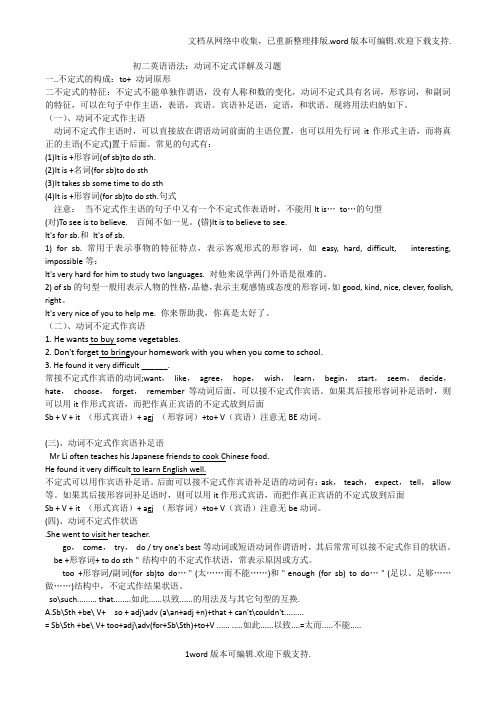
初二英语语法:动词不定式详解及习题一..不定式的构成:to+ 动词原形二不定式的特征:不定式不能单独作谓语,没有人称和数的变化,动词不定式具有名词,形容词,和副词的特征,可以在句子中作主语,表语,宾语。
宾语补足语,定语,和状语。
现将用法归纳如下。
(一)、动词不定式作主语动词不定式作主语时,可以直接放在谓语动词前面的主语位置,也可以用先行词it作形式主语,而将真正的主语(不定式)置于后面。
常见的句式有:(1)It is +形容词(of sb)to do sth.(2)It is +名词(for sb)to do sth(3)It takes sb some time to do sth(4)It is +形容词(for sb)to do sth.句式注意:当不定式作主语的句子中又有一个不定式作表语时,不能用It is…to…的句型(对)To see is to believe.百闻不如一见。
(错)It is to believe to see.It's for sb.和It's of sb.1) for sb. 常用于表示事物的特征特点,表示客观形式的形容词,如easy, hard, difficult,interesting, impossible等:It's very hard for him to study two languages. 对他来说学两门外语是很难的。
2) of sb的句型一般用表示人物的性格,品德,表示主观感情或态度的形容词,如good, kind, nice, clever, foolish, right。
It's very nice of you to help me. 你来帮助我,你真是太好了。
(二)、动词不定式作宾语1. He wants to buy some vegetables.2. Don't forget to bringyour homework with you when you come to school.3. He found it very difficult ______.常接不定式作宾语的动词;want,like,agree,hope,wish,learn,begin,start,seem,decide,hate,choose,forget,remember等动词后面,可以接不定式作宾语。
初二英语动词不定式讲义和练习 附带答案 (2)
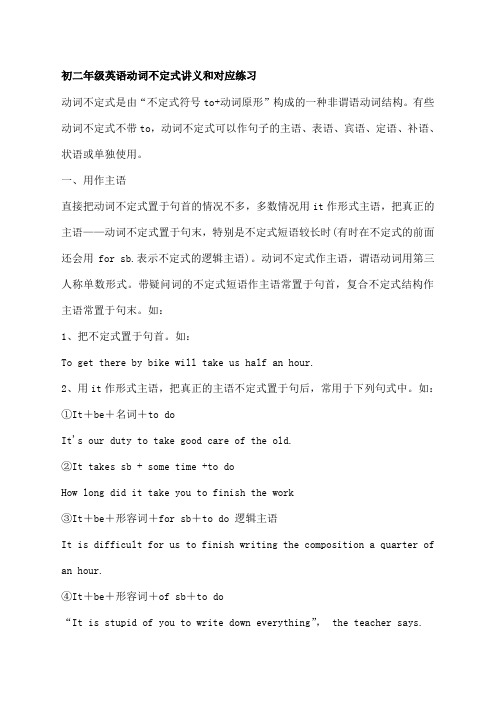
初二年级英语动词不定式讲义和对应练习动词不定式是由“不定式符号to+动词原形”构成的一种非谓语动词结构。
有些动词不定式不带to,动词不定式可以作句子的主语、表语、宾语、定语、补语、状语或单独使用。
一、用作主语直接把动词不定式置于句首的情况不多,多数情况用it作形式主语,把真正的主语——动词不定式置于句末,特别是不定式短语较长时(有时在不定式的前面还会用for sb.表示不定式的逻辑主语)。
动词不定式作主语,谓语动词用第三人称单数形式。
带疑问词的不定式短语作主语常置于句首,复合不定式结构作主语常置于句末。
如:1、把不定式置于句首。
如:To get there by bike will take us half an hour.2、用it作形式主语,把真正的主语不定式置于句后,常用于下列句式中。
如:①It+be+名词+to doIt's our duty to take good care of the old.②It takes sb + some time +to doHow long did it take you to finish the work③It+be+形容词+for sb+to do 逻辑主语It is difficult for us to finish writing the composition a quarter of an hour.④It+be+形容词+of sb+to do“It is stupid of you to write down everything”, the teacher says.注意:在③中,常用表示客观情况的形容词,如:difficult, easy, hard, important, impossible, necessary 等;在④中,常用careless, clever, good, foolish, honest, kind, lazy, nice, right, silly, stupid, wise等表示赞扬或批评的词,强调对人的评价。
(完整版)初二英语语法不定式详解及习题

初二英法:不定式解及一..不定式的构成: to+ 原形二不定式的特点:不定式不能够独作,没有人称和数的化,不定式具有名,形容,和副的特点,能够在句子中作主,表,。
足,定,和状。
将用法以下。
〔一〕、不定式作主不定式作主,能够直接放在前面的主地址,也能够用先行it 作形式主,而将真正的主 (不定式 )置于后边。
常的句式有:(1)It is +形容 (of sb)to do sth.(2)It is +名 (for sb)to do sth(3)It takes sb some time to do sth(4)It is +形容 (for sb)to do sth. 句式注意:当不定式作主的句子中又有一个不定式作表,不能够用It is⋯ to ⋯的句型( )To see is to believe.百不如一。
( )It is to believe to see.It's for sb. 和 It's of sb.1) for sb. 常用于表示事物的特点特点,表示客形式的形容,如impossible 等:It's very hard for him to study two languages.他来学两外是很的。
2) of sb 的句型一般用表示人物的性格,道德,表示主感情或度的形容,right 。
easy, hard, d ifficult,interesting,如 good, kind, nice, clever, foolish,It's very nice of you to help me.你来帮助我,你真是太好了。
〔二〕、不定式作1.He wants to buy some vegetables.2.Don't forget to bringyour homework with you when you come to school.3.He found it very difficult ______.常接不定式作的;want , like, agree, hope , wish , learn , begin , start , seem, decide ,hate, choose, forget , remember等后边,能够接不定式作。
初二英语语法不定式详解及习题

初二英语语法:动词不定式详解及习题一..不定式的构成:to+动词原形二不定式的特征:不定式不能单独作谓语,没有人称和数的变化,动词不定式具有名词,形容词,和副词的特征,可以在句子中作主语,表语,宾语。
宾语补足语,定语,和状语。
现将用法归纳如下。
(一)、动词不定式作主语动词不定式作主语时,可以直接放在谓语动词前面的主语位置,也可以用先行词it作形式主语,而将真正的主语印定式)置于后面。
常见的句式有:(1)It is + 形容词(of sb)to do sth.(2)It is +名词(for sb)to do sth(3)It takes sb some time to do sth(4)It is + 形容词(for sb)to do sth.句式注意:当不定式作主语的句子中又有一个不定式作表语时,不能用It is…to…的句型(^)To see is to believe.百闻不如一见。
(错)It is to believe to see.It's for sb.和It's of sb.1)for sb.常用于表示事物的特征特点,表示客观形式的形容词,如easy, hard, difficult, interesting, impossible 等:It's very hard for him to study two languages. 对他来说学两门外语是很难的。
2)of sb的句型一般用表示人物的性格,品德,表示主观感情或态度的形容词,如good, kind, nice, clever, foolish, right。
It's very nice of you to help me.你来帮助我,你真是太好了。
(二)、动词不定式作宾语1.He wants to buy some vegetables.2.Don't forget to bringyour homework with you when you come to school.3.He found it very difficult.常接不定式作宾语的动词;want, like, agree, hope, wish, learn, begin, start, seem, decide,hate, choose, forget, remember等动词后面,可以接不定式作宾语。
动词不定式用法全解(含测试题及答案)

动词不定式用法全解英语动词的非谓语形式为三种:动词不定式、动名词和分词。
非谓语动词没有人称和数的变化。
动词不定式是一种非谓语动词形式,其结构为“to+动词原形”,其中to不是介词,而是动词不定式的符号,称为小品词,动词不定式没有人称和数的变化。
动词不定式和其后面的名词等构成不定式短语,在句子中可以用作主语、表语、宾语、补足语、定语、状语等。
动词不定式的形式:第一部分动词不定式的时态一、动词不定式的时态:动词不定式不能在句中作谓语,尽管它本身有时态的变化,但是却不能靠自身的变化形式表示动作发生的具体时间。
动词不定式发生的时间,一般只能根据谓语动词的时间,产生相对的先后时间关系。
1.不定式的一般式,表示不定式的动作与谓语动词动作几乎同时发生,或在谓语动作之后发生,或者不强调不定式动作的时间性。
但不定式表原因时,往往先于谓语动作之前发生。
如:The news will not fail to surprise him.这个消息将不会不使他大吃一惊的。
(不定式动作在将来和谓语动作同时发生)I helped to repair the car.我帮助修理汽车。
(不定式动作在过去与谓语动作同时发生)He didn't know where to go.他不知道该去哪儿。
(不定式稍晚于谓语动作)Tell your brother not to come tomorrow.告诉你哥哥明天不要来。
(不定式晚于谓语动作)判断:He decided to sell his car.I tried to go to school in time.I hope to see you soon不定式表示谓语动作的原因时,往往发生在谓语动作之前。
如:I am very happy to see you here.She seemed surprised to meet us.(先是遇见我们,她然后很吃惊)2.不定式的完成式,通常表示动作发生在谓语动词之前。
初中非谓语动词动词不定式讲解与练习 (5页)
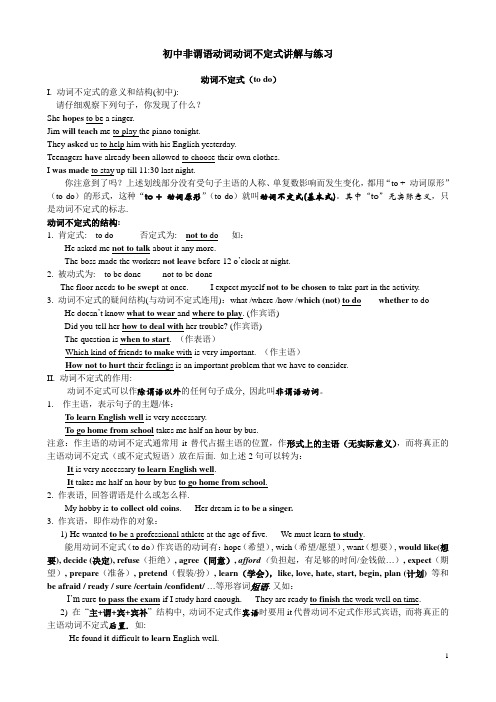
初中非谓语动词动词不定式讲解与练习动词不定式(to do)I. 动词不定式的意义和结构(初中):请仔细观察下列句子,你发现了什么?She hopes to be a singer.Jim will teach me to play the piano tonight.They ask ed us to help him with his English yesterday.Teenagers have already been allowed to choose their own clothes.I was made to stay up till 11:30 last night.你注意到了吗?上述划线部分没有受句子主语的人称、单复数影响而发生变化,都用“to + 动词原形”(to do)的形式,这种“to + 动词原形”(to do)就叫动词不定式(基本式)。
其中“to”无实际意义,只是动词不定式的标志.动词不定式的结构:1. 肯定式: to do 否定式为: not to do 如:He asked me not to talk about it any more.The boss made the workers not leave before 12 o’clock at night.2. 被动式为: to be done not to be doneThe floor needs to be swept at once. I expect myself not to be chosen to take part in the activity.3. 动词不定式的疑问结构(与动词不定式连用):what /where /how /which (not) to do whether to doHe doesn’t know what to wear and where to play. (作宾语)Did you tell her how to deal with her trouble? (作宾语)The question is when to start. (作表语)Which kind of friends to make with is very important. (作主语)How not to hurt their feelings is an important problem that we have to consider.II. 动词不定式的作用:动词不定式可以作除谓语以外的任何句子成分, 因此叫非谓语动词。
初中英语动词不定式部分知识讲解及练习

动词不定式一. 定义:动词不定式是非谓语动词的一种,它没有人称和数的变化,在句子中不能独立作谓语,但它仍保持动词的特点,既可以有自己的宾语和状语。
同时动词不定式又具有名词、形容词、副词的特征,在句中可以作主语、表语、宾语、宾语补足语、定语和状语。
二. 动词不定式的构成:to+动词原形三. 动词不定式作宾语动词不定式作宾语的注意事项(6点)1.可以接带to的动词不定式作宾语的动词主要有:要求选择同意(ask, choose, agree),期望决定学习(expect, hope, decide, learn),宁可假装知道(prefer, pretend, know),希望想要愿意(wish, want, would like / love)。
如:1)We decided to talk to some students about why they go there.2)He prefers to eat white bread and rice.3)Id love to visit Mexico.2.动词decide, know, learn, show, teach, tell...,介词结构on...可用疑问词带to 的不定式短语作宾语,但why后面的不定式不带to。
如:1)Could you please tell me where to park my car?2)It gives advice on what to do in lots of different situations.3.动词feel, find, make, think等后面,可以用it作形式宾语代替真正的宾语——动词不定式,句子结构是...feel / find / make / ... it + adj. / n. + to do...。
如:I find it difficult to remember everything.4.既可接动词不定式又可接v_ing形式作宾语,意思差别不太大的动词有begin, start, like, love等。
初中英语 语法梳理及练习 动词不定式

初中英语语法梳理和提高动词不定式不定式:to + 动词原形知识梳理:提纲挈领,抓住重点和难点!动词不定式的基本形式是“to + 动词原形”,有时可以不带to。
动词不定式(或不定式短语)没有人称和数的变化,在句子中不能作谓语。
动词不定式仍可保留动词的特点,即可以有自己的宾语和状语。
动词不定式同它的宾语或状语构成不定式短语。
如:to read the newspaper, to speak at the meeting 等动词不定式具有名词、形容词和副词的特征,因此在句子中可以作主语、表语、宾语、宾语补足语、定语和状语:句法作用例句作宾语She wanted to borrowed my radio.They began to read and write.作状语She went to see h er grandma lastSunday .He came to give us a talk yesterday.作宾语补足语Lucy asked him to turn off the radio. She asked me to speak more loudlyJim told Ling Feng to go home at once . The father made his son study hard.作定语Have you got anything to say?I had something to eat this morning .作主语To learn a foreign language is not easy.注:作主语用的动词不定式常常为it替代,动词不定式(或短语)放在后面。
例如:It is not easy to learn a foreign language.It took us three days to do the work.动词不定式的否定形式由“not+动词不定式”构成. 如:Tell him not to be late.The policeman told the boys not to play in the street.4) 不定式省去to的情况: 在感官动词see,watch,look at,hear, listen to,feel 和使役动词make,have,let等所接的宾语中(不定式做宾语不足语),不定式应省去to。
中考英语专题讲练 动词不定式(含解析)
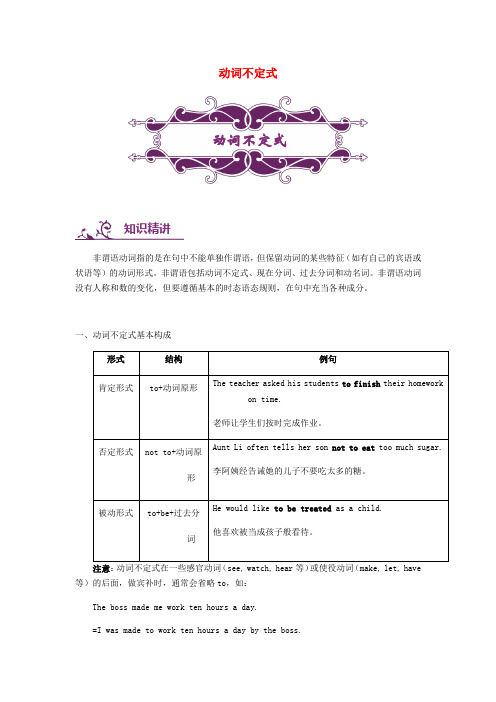
动词不定式动词不定式知识精讲非谓语动词指的是在句中不能单独作谓语,但保留动词的某些特征(如有自己的宾语或状语等)的动词形式。
非谓语包括动词不定式、现在分词、过去分词和动名词。
非谓语动词没有人称和数的变化,但要遵循基本的时态语态规则,在句中充当各种成分。
一、动词不定式基本构成注意:动词不定式在一些感官动词(see, watch, hear等)或使役动词(make, let, have 等)的后面,做宾补时,通常会省略to,如:The boss made me work ten hours a day.=I was made to work ten hours a day by the boss.这个老板让我一天工作十个小时。
二、动词不定式的语法功能动词不定式在句子中可充当主语、表语、宾语、宾补、定语和状语(即除谓语之外的各种成分)。
1. 不定式作主语1). 动词不定式短语作句子主语时,视为单数,谓语动词用第三人称单数,如:To make work more efficient is our goal.让工作更有效率是我们的目标。
2). 不定式短语作主语时,为了考虑句子的平衡,常用it作形式主语,而将真正的不定式主语放在句子后面,结构为:It+is/ was+adj. (+for sb.)+动词不定式,如上一句话也可写成:It’s our goal to make work efficient.我们的目标是让工作更有效率。
It’s very important for us to learn English well.学好英语对于我们来说很重要。
2. 动词不定式作宾语1). 动词不定式跟在及物动词后作宾语,这种形式非常常见,就是我们平时积累的一些动词后面跟to do形式,如:I have decided to study hard.我已经决定要刻苦学习。
常见的这类动词有:begin, choose, continue, decide, expect, fail, forget, hate, help, hope, learn, manage, mean, need, offer, plan, prefer, pretend, promise, refuse, try, want, wish, determine, afford, agree, start, like等。
初中英语语法(动词不定式)讲解_专项练习及答案.
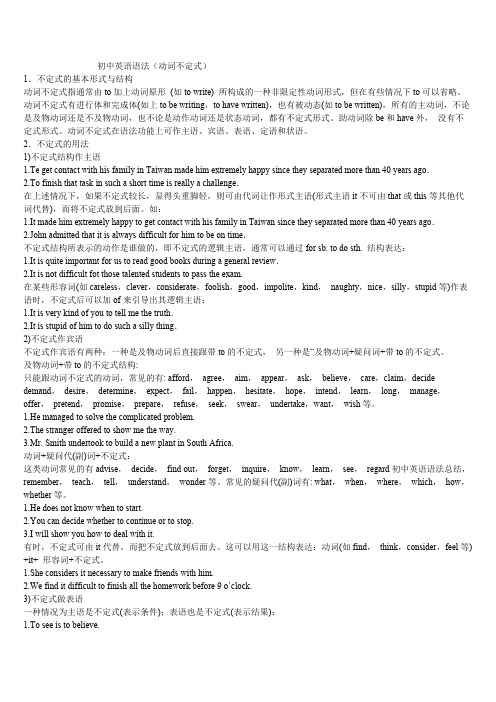
初中英语语法(动词不定式)1.不定式的基本形式与结构动词不定式指通常由to加上动词原形(如to write) 所构成的一种非限定性动词形式,但在有些情况下to可以省略。
动词不定式有进行体和完成体(如上to be writing,to have written),也有被动态(如to be written),所有的主动词,不论是及物动词还是不及物动词,也不论是动作动词还是状态动词,都有不定式形式。
助动词除be和have外,没有不定式形式。
动词不定式在语法功能上可作主语、宾语、表语、定语和状语。
2.不定式的用法1)不定式结构作主语1.Te get contact with his family in Taiwan made him extremely happy since they separated more than 40 years ago.2.To finish that task in such a short time is really a challenge.在上述情况下,如果不定式较长,显得头重脚轻,则可由代词让作形式主语(形式主语it不可由that或this等其他代词代替),而将不定式放到后面。
如:1.It made him extremely happy to get contact with his family in Taiwan since they separated more than 40 years ago.2.John admitted that it is always difficult for him to be on time.不定式结构所表示的动作是谁做的,即不定式的逻辑主语,通常可以通过for sb. to do sth. 结构表达:1.It is quite important for us to read good books during a general review.2.It is not difficult fot those talented students to pass the exam.在某些形容词(如careless,clever,considerate,foolish,good,impolite,kind,naughty,nice,silly,stupid等)作表语时,不定式后可以加of来引导出其逻辑主语:1.It is very kind of you to tell me the truth.2.It is stupid of him to do such a silly thing.2)不定式作宾语不定式作宾语有两种:一种是及物动词后直接跟带to的不定式,另一种是“及物动词+疑问词+带to的不定式。
初中动词不定式专题讲解及练习(全面).
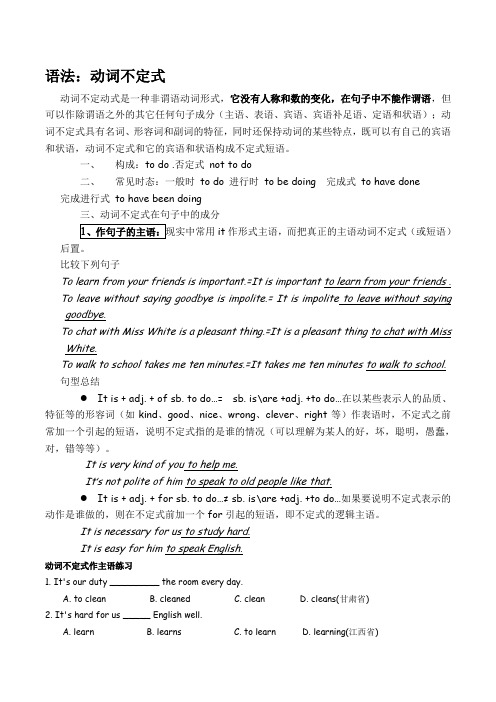
语法:动词不定式动词不定动式是一种非谓语动词形式,它没有人称和数的变化,在句子中不能作谓语,但可以作除谓语之外的其它任何句子成分(主语、表语、宾语、宾语补足语、定语和状语);动词不定式具有名词、形容词和副词的特征,同时还保持动词的某些特点,既可以有自己的宾语和状语,动词不定式和它的宾语和状语构成不定式短语。
一、构成:to do .否定式not to do二、常见时态:一般时to do 进行时to be doing 完成式to have done完成进行式to have been doing三、动词不定式在句子中的成分it作形式主语,而把真正的主语动词不定式(或短语)后置。
比较下列句子To learn from your friends is important.=It is important to learn from your friends .To leave without saying goodbye is impolite.= It is impolite to leave without saying goodbye.To chat with Miss White is a pleasant thing.=It is a pleasant thing to chat with Miss White.To walk to school takes me ten minutes.=It takes me ten minutes to walk to school.句型总结●It is + adj. + of sb. to do…= sb. is\are +adj. +to do…在以某些表示人的品质、特征等的形容词(如kind、good、nice、wrong、clever、right等)作表语时,不定式之前常加一个引起的短语,说明不定式指的是谁的情况(可以理解为某人的好,坏,聪明,愚蠢,对,错等等)。
初中动词不定式专题讲解及练习(全面)

语法:动词不定式动词不定动式是一种非谓语动词形式,它没有人称和数的转变,在句子中不能作谓语,但能够作除谓语之外的其它任何句子成份(主语、表语、宾语、宾语补足语、定语和状语);动词不定式具出名词、形容词和副词的特点,同时还维持动词的某些特点,既能够有自己的宾语和状语,动词不定式和它的宾语和状语组成不定式短语。
一、组成:to do .否定式not to do二、常见时态:一样时to do 进行时to be doing 完成式to have done完成进行式to have been doing三、动词不定式在句子中的成份一、作句子的主语:现实中常用it 作形式主语,而把真正的主语动词不定式(或短语)后置。
比较以下句子To learn from your friends is important.=It is important to learn from your friends .To leave without saying goodbye is impolite.= It is impolite to leave without saying goodbye.To chat with Miss White is a pleasant thing.=It is a pleasant thing to chat with Miss White.To walk to school takes me ten minutes.=It takes me ten minutes to walk to school.句型总结It is + adj. + of sb. to do…= sb. is\are +adj. +todo…在以某些表示人的品质、特点等的形容词(如kind、good、nice、wrong、clever、right等)作表语时,不定式之前常加一个引发的短语,说明不定式指的是谁的情形(能够明白得为某人的好,坏,伶俐,愚蠢,对,错等等)。
初中语法动词不定式讲解及习题
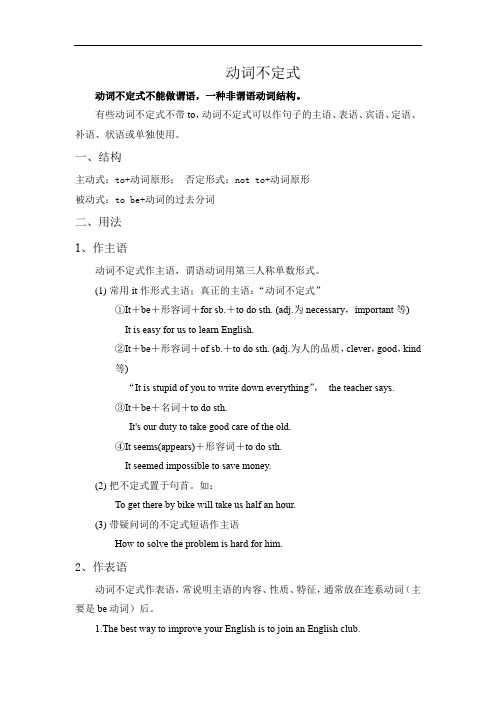
动词不定式动词不定式不能做谓语,一种非谓语动词结构。
有些动词不定式不带to,动词不定式可以作句子的主语、表语、宾语、定语、补语、状语或单独使用。
一、结构主动式:to+动词原形;否定形式:not to+动词原形被动式:to be+动词的过去分词二、用法1、作主语动词不定式作主语,谓语动词用第三人称单数形式。
(1)常用it作形式主语;真正的主语:“动词不定式”①It+be+形容词+for sb.+to do sth. (adj.为necessary,important等)It is easy for us to learn English.②It+be+形容词+of sb.+to do sth. (adj.为人的品质,clever,good,kind等)“It is stupid of you to write down everything”,the teacher says.③It+be+名词+to do sth.It's our duty to take good care of the old.④It seems(appears)+形容词+to do sth.It seemed impossible to save money.(2)把不定式置于句首。
如:To get there by bike will take us half an hour.(3)带疑问词的不定式短语作主语How to solve the problem is hard for him.2、作表语动词不定式作表语,常说明主语的内容、性质、特征,通常放在连系动词(主要是be动词)后。
1.The best way to improve your English is to join an English club.2.The first thing is to greet the teacher.注意:不定式作表语表示具体动作或将来动作;动名词作表语表示抽象的一般行为。
八年级英语动词不定式+双宾语讲解及练习

八年级英语动词不定式+双宾语讲解及练习专题三:动词不定式+双宾语一.动词不定式含义当我们要表示“想做某事、需要做某事或决定做某事”时,就会出现两个动词连用的情况,这时应如何表达呢?同学们自然会想到want to do sth。
need to do sth.和decide to do sth.等表达方式。
行为动词后的动词都采用了“to+动词原形”的结构。
我们把这种结构称为动词不定式。
动词不定式没有人称和数的变化,在句中不能作谓语。
二.动词不定式的功能1.动词不定式作宾语(1)动词+to do sth.表示的多为将来的行为。
如:want to do sth。
/ hope to do sth。
/ learn to do sth。
/ try to do sth。
/ decide to do sth。
/ forget to doXXX to do sth。
/ stop to do sth./ plan to do sth.等(2)to偶然可省略,布局为动词+do sth.had better do sth。
/ why not do sth.2.动词不定式作宾语补足语(1)宾语补足语是对宾语的补充说明,结构:“动词+宾语+动词不定式”。
其否定结构要在todo前面加not,构成not to do。
如:allow sb。
to do sth。
/ choose sb。
to do sth。
/ want sb。
to do sth。
/ tell sb。
to do sth。
/ ask sb。
to doXXX(2)在表示感觉、祈使等意义的动词help。
make。
let。
have。
feel。
see等后接不带to的不定式。
3.动词不定式作目的状语(1)假如透露表现“做某事是为了甚么”,能够用动词不定式透露表现目标,常与soas,in order等组成短语不定式既可以放在句首,也可以放在句尾。
如:XXX to have rest.=To have rest。
初三英语动词不定式部分知识讲解及练习

学生姓名:上课时间:动词不定式一. 定义:动词不定式是非谓语动词的一种,它没有人称和数的变化,在句子中不能独立作谓语,但它仍保持动词的特点,既可以有自己的宾语和状语。
同时动词不定式又具有名词、形容词、副词的特征,在句中可以作主语、表语、宾语、宾语补足语、定语和状语。
二. 动词不定式的构成:to+动词原形三. 动词不定式作宾语1、作宾语She wanted to become an actor.后面能接不定式作宾语的动词有:agree, ask, choose, decide, forget, hope, learn, want, wish, would like等。
We hope to get there before dark. 我们希望天黑以前到那儿。
The girl decided to do it herself. 那个姑娘决定自己做那件事。
动词不定式作宾语的注意事项(2点1. 有些动词既可跟不定式作宾语,也可跟动名词作宾语,但含义不同:remember to do 记住要做某事remember doing 记得曾经做过某事forget to do忘记要做某事forget doing 忘记曾经做过某事stop to do 停下来去做某事stop doing 停止做某事go on to do 继续做另一件事go on doing 继续做原来在做的事like doing 喜欢做……(与生俱来的,一般不容易改变like to do 喜欢做……(后天形成的,很容易改变I remember seeing you somewhere before.我记得以前在哪儿见过你。
Please remember to turn off the light when you leave.离开时请记得关好灯。
2. 不定式作宾语时,如带有宾语补足语,则要把不定式放到后面,用it作形式宾语,构成“主语+动词+it+宾补(形容词、名词+不定式”结构。
中考英语动词不定式及其用法讲解+练习
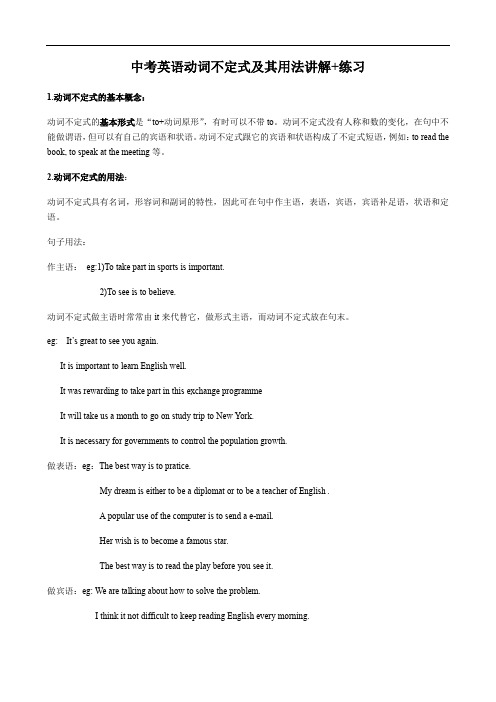
中考英语动词不定式及其用法讲解+练习1.动词不定式的基本概念:动词不定式的基本形式是“to+动词原形”,有时可以不带to。
动词不定式没有人称和数的变化,在句中不能做谓语,但可以有自己的宾语和状语。
动词不定式跟它的宾语和状语构成了不定式短语,例如:to read the book, to speak at the meeting等。
2.动词不定式的用法:动词不定式具有名词,形容词和副词的特性,因此可在句中作主语,表语,宾语,宾语补足语,状语和定语。
句子用法:作主语:eg:1)To take part in sports is important.2)To see is to believe.动词不定式做主语时常常由it来代替它,做形式主语,而动词不定式放在句末。
eg: It’s great to see you again.It is important to learn English well.It was rewarding to take part in this exchange programmeIt will take us a month to go on study trip to New York.It is necessary for governments to control the population growth.做表语:eg:The best way is to pratice.My dream is either to be a diplomat or to be a teacher of English .A popular use of the computer is to send a e-mail.Her wish is to become a famous star.The best way is to read the play before you see it.做宾语:eg: We are talking about how to solve the problem.I think it not difficult to keep reading English every morning.做宾补:eg: We all expect him to win the contest.Our teacher told us to listen carefully in class.注意:感官动词,或使役动词+宾语+无to的不定式Is Jack in the library ?Maybe I saw him go out with some books just now.Let those in need understand that we will go all out to help them.做定语:Liu Yang is the Chinese woman astronaut to enter the space.You are the last one to win the price.In the future , human will have less work to do.Why don’t you go out to play Rose?I’m afraid I can’t . I have a lot of homework to do.做状语:动词不定式做状语可以修饰动词,一般在句中做原因,目的和结果状语,动词不定式做状语可单独放在句首,句中或句末。
人教版八年级下册英语考点动词不定式讲解及练习Word版(有答案)

动词不定式一、动词不定式在句子中不能充当谓语,没有人称和数的变化。
二、动词不定式是由“to+动词原形”构成(有时可以不带to)。
动词不定式的否定形式是“not+动词不定式”(not不与助动词连用)。
三、动词不定式短语具有名词、形容词和副词等的功能,可在句中用做多种句子成分。
1、主语:常置于句末,而用it代替其做形式主语。
To go in for sports helps you stay fit.It is dangerous to swim in the deep sea on your own.注:此句式中不定式逻辑上的主语可由for或of引出,逻辑主语由of引出时,表语的形容词为kind, nice, good, polite, clever, foolish, right, wrong等表示评价的形容词。
例:It’s right of him to refuse the invitation. (him为逻辑主语)2、表语:Our duty is to protect the environment.3、动词宾语:此种情况可按固定搭配或句式去记。
例:Would you like to see my photos?Kevin planned to visit his uncle.和plan用法一样的词还有:start, want, agree, hope, begin, decide等。
I found it very difficult to get a job. (it为形式宾语)4、宾语补足语:(1) 在多数复合宾语及物动词后要带to。
例:I asked a friend to read it to me. (book4,L2)(2) 在表示感觉、致使等意义的动词(see, watch, hear, feel, notice, observe, make, let, have, help等) 后不带to。
初中英语动词不定式详细讲解+练习
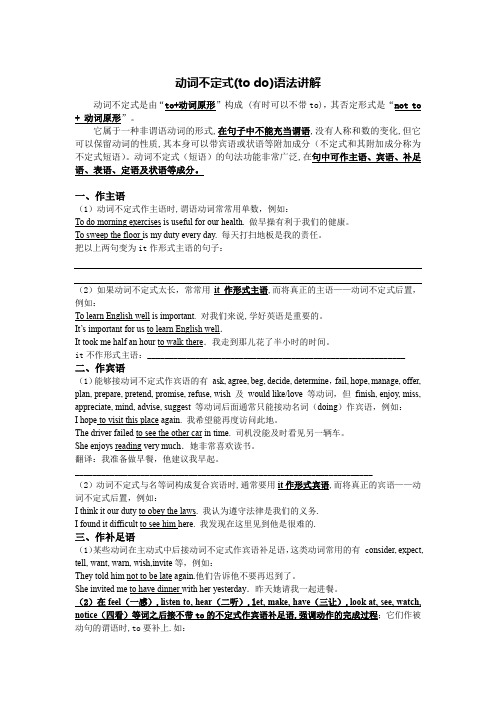
动词不定式(to do)语法讲解动词不定式是由“to+动词原形”构成 (有时可以不带to),其否定形式是“not to + 动词原形”。
它属于一种非谓语动词的形式,在句子中不能充当谓语,没有人称和数的变化,但它可以保留动词的性质,其本身可以带宾语或状语等附加成分(不定式和其附加成分称为不定式短语)。
动词不定式(短语)的句法功能非常广泛,在句中可作主语、宾语、补足语、表语、定语及状语等成分。
一、作主语(1)动词不定式作主语时,谓语动词常常用单数,例如:To do morning exercises is useful for our health. 做早操有利于我们的健康。
To sweep the floor is my duty every day. 每天打扫地板是我的责任。
把以上两句变为it作形式主语的句子:(2)如果动词不定式太长,常常用it 作形式主语,而将真正的主语——动词不定式后置,例如:To learn English well is important. 对我们来说,学好英语是重要的。
It’s important for us to learn English well.It took me half an hour to walk there.我走到那儿花了半小时的时间。
it不作形式主语:___________________________________________________________ 二、作宾语(1)能够接动词不定式作宾语的有ask, agree, beg, decide, determine,fail, hope, manage, offer, plan, prepare, pretend, promise, refuse, wish 及would like/love 等动词,但finish, enjoy, miss, appreciate, mind, advise, suggest 等动词后面通常只能接动名词(doing)作宾语,例如:I hope to visit this place again.我希望能再度访问此地。
动词不定式专项讲解及训练(有答案)

动词不定式专项训练A. to solveB. to be solveC. being solvedD. solvingA. for her to returnB. that she must returnC. her returningD. of him to returnA. costs... to getB. costs... gettingC. takes... to getD. takes... gettingA. to explainB. to have been explainedC. to be explainedD. to be explainingA. to learnB. to be learningC. to have learnedD. to have been learningKeys: 1-5 A A C C C专项练习1.The flu is believed_______ by viruses that like to reproduce in the cells inside the human nose and throat.A. causingB. being causedC. to be causedD. to have been caused2.There is a new problem involved in the popularity of private cars road conditions needA. that. .. to be improvedB. which ... to be improvedC. where. . . to be improvingD. when.. . improving3.Remember_________the magazine when you have finished reading it.A. putting backB. having put backC. to put backD. will put back4.—I'm sorry I forgot________ your dictionary.—Let's use Li Hua's.A. to takeB. takingC. to bringD. bringingA. to do whatB. what to doC. doing whatD. what doingA. writing... phoningB. to write. . . to phoneC. writing... to phoneD. to write. . . phoning7.Tom is always forgetting things he has done. Yesterday, he forgot and looked for it eve-rywhere.A. to post the letterB. to have the letter postedC. to having posted the letterD. having posted the letterA. to be notB. not to beC. not beingD. being not9.My brother regretted _______ a lecture given by Prof. Wang.A. missingB. to missC. missedD. being missing10.I regret _______ you that we are unable to offer you a job.A. informingB. having informedC. to informD. to informing11.He felt tired with typing the lecture. So he stopped_______ a short break.A. havingB. to haveC. takingD. to taking12.In order to gain a bigger share in the international market, many state-run companies arestriving their products more competitive.A. to makeB. makingC. to have madeD. having madeA. to sit... weptB. to sit. .. weepingC. sit... weptD. sat. . . weeping14.—You have come just in time tohelp us.—Fine. What needs________________________?A. I doB. doneC. to be doneD. to do15.That evening, he set about_________ t he report_______ the next morning.A. write... to hand inB. to write.. . handing inC. written... to hand inD. writing... to be handed in16.There seemed nothing ________ to do but ________ f or the doctor.A. leave... sendB. left... to sendC. left... sendD. leaving... send17.Do you think it difficult________ a dolphin ________ ?A. to train... jumpingB. training... for jumpingC. to train... jumpD. to train... to jump18.I prefer _______ rather than_______ .A. to do some reading... watching TVB. doing some reading... watching TVC. to do some reading... watch TVD. doing some reading... to watch TV19.The two boys pretended _________ v ery hard, though they did nothing.A. studyB. studyingC. to be studiedD. to be studying Keys: 1-5 CACCB6-10 CDBAC 11-15 BAB CD 16-19CDCD专项练习1.An army spokesman stressed that all the soldiers had been ordered clear warnings before firing any shots.A. to issueB. being issuedC. to have issuedD. to beissuedA. practise to singB. practise singingC. to practise to singD. to practise singing3.—What can we do to help Li Ming?A. making him to realizeB. making him realizeC. to make him realizeD. to make him to realizeA. disappearB. to disappearC. disappearingD. disappearedA. to writeB. writtenC. writeD. writingA. madeB. to makeC. makingD. to be makingA. saysB. sayingC. sayD. saidA. give upB. giving upC. to give upD. to giving upA. to commentB. commentC. to commentingD. being commentedA. reciteB. recitedC. recitingD. to reciteA. repeat the question againB. repeating the questionC. to repeating the questionD. to repeat the questionA. to be destroyedB. to have been destroyedC. to be destroyingD. to have been destroyingA. to go alongB. going alongC. went alongD. will goalongA. to get it to startB. get it startD. getting it startedC. to get it startedA. to sweepB. to be sweptC. should sweepD. being swept Keys:1-5 ADC AC6-10 CCCBA 11-15 DBACB1.—I'd like to buy a car made in Shanghai.—Okay, Sir. You have several models ________ .A. to chooseB. to be chosen fromC. to choose fromD. for choosing2.It's time________ rice.A. for transplantB. of transplantingC. to transplantD. to transplanting3.It is a very difficult problem. I need a few days_________ .A. of thinking over itB. to think it overC. of thinking it overD. to think over it4.People need homes _______ and food ________ .A. to live... to eatB. to live in... to eatC. live. . . to eatD. to live in... to eat for5.Columbus was the first _________ t he New Continent.A. to have discoveredB. to discoverC. discoveringD. having discovered Keys:1-5 CCBBB专项练习A. for the family to liveB. for the family to live inC. that the family can't live inD. that the family can't liveA. so everyone to understandB. for every one understoodC. for everyone to understandD. for understandingA. to get along withB. to get alongC. to be got along withD. to getting along withA. for us in followingB. for us to be followedC. to be followedD. for us to followA. to drink itB. to be drunkC. to drinkD. to be drinkingA. to seeB. for to seeC. for seeingD. seeing7. _______ , I don't want to argue with them about the matter.A. To tell you the truthB. Telling the truthC. Having told you the truthD. Out of the truthA. to not frightenB. so as not to frightenC. in order to not frightenD. for not frighteningA. showing me the wayB. as to show me the wayC. to show me the wayD. so you can show me the wayA. to leaveB. that he leavesC. as to leaveD. leavingKeys:1-5 BCADC6-10 AABCC专项练习vi. 不定式的时态与语态意义1. 不定式的时态意义1)一般式:不定式的动作与谓语动词的动作同时发生或是在其后发生。
- 1、下载文档前请自行甄别文档内容的完整性,平台不提供额外的编辑、内容补充、找答案等附加服务。
- 2、"仅部分预览"的文档,不可在线预览部分如存在完整性等问题,可反馈申请退款(可完整预览的文档不适用该条件!)。
- 3、如文档侵犯您的权益,请联系客服反馈,我们会尽快为您处理(人工客服工作时间:9:00-18:30)。
语法:动词不定式动词不定动式是一种非谓语动词形式,它没有人称和数的变化,在句子中不能作谓语,但可以作除谓语之外的其它任何句子成分(主语、表语、宾语、宾语补足语、定语和状语);动词不定式具有名词、形容词和副词的特征,同时还保持动词的某些特点,既可以有自己的宾语和状语,动词不定式和它的宾语和状语构成不定式短语。
一、构成:to do .否定式not to do二、常见时态:一般时to do 进行时to be doing 完成式to have done完成进行式to have been doing三、动词不定式在句子中的成分1、作句子的主语:现实中常用it作形式主语,而把真正的主语动词不定式(或短语)后置。
比较下列句子To learn from your friends is important.=It is important to learn from your friends .To leave without saying goodbye is impolite.= It is impolite to leave without sayinggoodbye.To chat with Miss White is a pleasant thing.=It is a pleasant thing to chat with MissWhite.To walk to school takes me ten minutes.=It takes me ten minutes to walk to school.句型总结在以某些表示人的品质、sb. is are +adj. +to do…It is + adj. + of sb. to do…=特征等的形容词(如kind、good、nice、wrong、clever、right等)作表语时,不定式之前常加一个引起的短语,说明不定式指的是谁的情况(可以理解为某人的好,坏,聪明,愚蠢,对,错等等)。
It is very kind of you to help me.It’s not polite of him to speak to old people like that.如果要说明不定式表示的are +adj. +to do…It is + adj. + for sb. to do…≠ sb. is动作是谁做的,则在不定式前加一个for引起的短语,即不定式的逻辑主语。
It is necessary for us to study hard.It is easy for him to speak English.动词不定式作主语练习1. It's our duty _________ the room every day.A. to cleanB. cleanedC. cleanD. cleans(甘肃省)2. It's hard for us _____ English well.A. learnB. learnsC. to learnD. learning(江西省)3.建造这座立交桥将花费工人们一年多的时间。
It will ______the workers over a year _____ ____the flyover.(北京市海淀区)4. It's very nice _____you to get me two tickets _________ the World Cup.A. for,ofB. of,forC. to,forD. of,to(安徽省)KEYS: 1. A 2.C 3. take, to build 4. B2、作句子的表语:不定式放在be 动词后面,用作表语如:Her dream is to be a policeman.My job is to help the patient.Your task is to clean the classroom.My dream is to own a robot.to take more exercise.The doctor’s suggestion isThe best way is to talk to your parents.His plan is to travel to Beijing this summer.My purpose is to help you solve this problem.3、作句子的宾语:不定式放在及物动词后,用作宾语。
能跟不定式作宾语的动词(及物)很多,常见的有want, like, hate, wish, hope, prefer, try, ask, start, begin, decide, learn,choose, agree, expect, remember, forget, plan, decide, would like, need, choose, agree, promise, refuse, set out, manage, pretend,I want to go home.The workers demanded to get better pay.They began to read and write.She forgot to close the door.He wanted to borrow my CD player.I hope to speak English well.The workers demanded to get better pay.I hope to hear from you soon.John doesn’twant to be the host of the charity show.They are trying to solve the problem by himself.Millions of people have learned to use computers.有些动词既可跟不定式作宾语,也可跟动名词作宾语,但含义不同:forget to do sth.忘记要做某事forget doing sth.忘记曾经做过某事stop to do sth. 停下来去做某事stop doing sth.停止做某事go on to do sth.继续做另一件事go on doing sth.继续做原来在做的事need to do sth.需要做某事need doing sth. 需要被做Don’t forge to turn off the lights before leaving.Father must stop smoking.This bike needs repairing/mending.注意1:动词不定式作宾语时如带有宾语补足语,则要把不定式放在后面,用it作形式主语,构成“主语+动词+it+宾补(形容词、名词)+不定式”结构I found it necessary to talk to him again.I found it important to learn English.I fond it difficult to learn physics.注意2:常用带to的动词不定式作宾语补足语的动词有want, ask, tell, order, get, wish, allow, invite, teach, encourage, beg, 等。
构成“vt,+sb.+(not)to do sth.”结构。
The teacher told us to read the text.He asked me not to tell you the news.His parents didn’t allow him to play.I expect you to give me some help.Mr.Lu asks ue to hand in our homework on time.The docter advised Mr. Green to drink more water.Mr. Wu tells the students not to shout in class.Mrs. Read whishes her son to learn English well.注意3:不定式作宾补省去 to 的情况(在被动语态中则to 不能省掉)常用省去to的动词不定式作补足语的动词有:一感(feel)、二听(hear, listen to)、三让(make, let, have)、四看(look at, see, watch, notice, observe)、半帮助help(可带to,也可不带to help sb (to) do sth)I made him to do his work. .----------------------------make sb.do sth.Please listen to me to sing this song again.-------------------listen to sb.do sth.I felt someone to open my door.--------------------------------feel sb.do sth.The boss made the girl to work ten hour a day.-------------make sb.do sth.You must watch me to do everything--------------------------watch sb.do sth.let anybody watch bad things, especially children.-------let Internet bars mustn’tsb.do sth.He often helps (to) clean the room.Mr. Zhang always helps us (to) learn English.被动语to要加上He was made to do his work (by me)They are made to work for 12 hours a day.He was heard to speak in the next room.John was made to wash the car for a week as a punishment.The patient was warned not to eat food after the operation.Intern et bars mustn’t let anybody watch bad things, especially children.动词不定式作宾语练习1.He wants ___ some vegetables.A. buyB. buyingC. to buyD. buys (山西省)2.Don't forget ______ your homework with you when you come to school.A. to bringB. bringingC. to takeD. taking (福建省)3.He found it very difficult ___A.sleepingB. sleepsC. sleptD. to fall asleep (湖南省)4. Robert often asks us ______ his Chinese, so his Chinese is much better than before.A. help himB. to help him withC. to help withD. helps him with (江苏省)5. Mr Li often teaches his Japanese friends ______ Chinese food.A. cookB. cooksC. to cookD. cooked (甘肃省)6. We saw him ___the building and go upstairs.A. to enterB. enterC. enteringD. entered (河南省)7. So much work usually makes them __very tired.A. to feelB. feelsC. feelingD. feel8. Your father is sleeping. You'd better ______.A. not wake up himB. not to wake up himC. not wake him upD. not to wake him up (陕西省)9. I was made ___ my homework in the afternoon.A. doB. doingC. to doD. didKeys: 1. C 2. A 3. D 4.B 5. C 6. B 7. D 8. C 9. C4、作句子的定语:不定式作定语时,应放在被修饰词的后面作后置定语。
